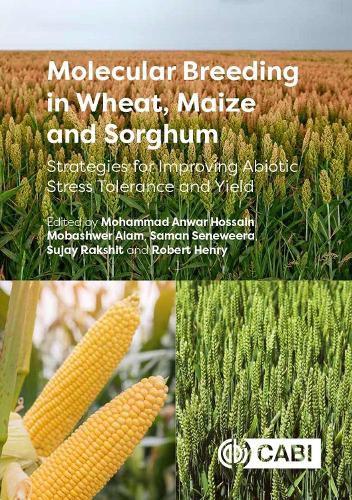Readings Newsletter
Become a Readings Member to make your shopping experience even easier.
Sign in or sign up for free!
You’re not far away from qualifying for FREE standard shipping within Australia
You’ve qualified for FREE standard shipping within Australia
The cart is loading…






The global population is projected to reach almost 10 billion by 2050, and food and feed production will need to increase by 70%. Wheat, maize and sorghum are three key cereals which provide nutrition for the majority of the world’s population. Their production is affected by various abiotic stresses which cause significant yield losses. The effects of climate change also increase the frequency and severity of such abiotic stresses. Molecular breeding technologies offer real hope for improving crop yields. Although significant progress has been made over the last few years, there is still a need to bridge the large gap between yields in the most favorable and most stressful conditions. This book: - Provides a valuable resource for wheat, maize and sorghum scientists working on breeding and molecular biology, physiology and biotechnology. - Presents the latest in-depth research in the area of abiotic stress tolerance and yield improvements. - Contains the necessary information to allow plant breeders to apply this research to effectively breed new varieties of these crops. It provides a consolidated reference for plant breeders and crop scientists working on the challenges of enhanced crop productivity and climate change adaptability.
$9.00 standard shipping within Australia
FREE standard shipping within Australia for orders over $100.00
Express & International shipping calculated at checkout
The global population is projected to reach almost 10 billion by 2050, and food and feed production will need to increase by 70%. Wheat, maize and sorghum are three key cereals which provide nutrition for the majority of the world’s population. Their production is affected by various abiotic stresses which cause significant yield losses. The effects of climate change also increase the frequency and severity of such abiotic stresses. Molecular breeding technologies offer real hope for improving crop yields. Although significant progress has been made over the last few years, there is still a need to bridge the large gap between yields in the most favorable and most stressful conditions. This book: - Provides a valuable resource for wheat, maize and sorghum scientists working on breeding and molecular biology, physiology and biotechnology. - Presents the latest in-depth research in the area of abiotic stress tolerance and yield improvements. - Contains the necessary information to allow plant breeders to apply this research to effectively breed new varieties of these crops. It provides a consolidated reference for plant breeders and crop scientists working on the challenges of enhanced crop productivity and climate change adaptability.